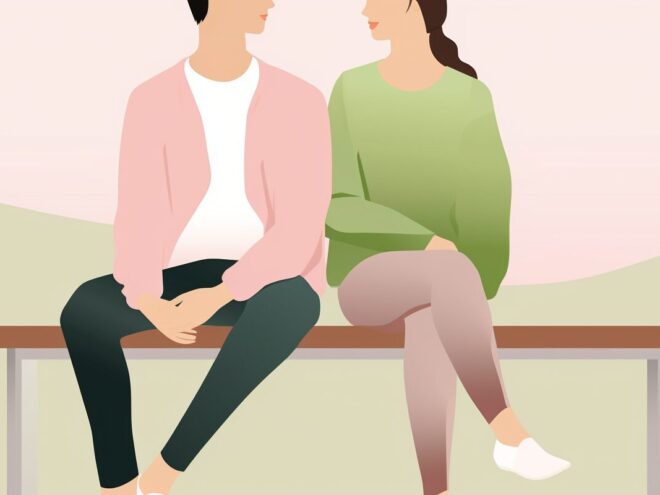Life • 01/30/2024
Clear Your Confusion: Understanding the Differences Between Sympathy vs. Empathy

Revivalist is a reader-supported endeavor and our posts may contain affiliate links. When you buy through links on our site, we may earn an affiliate commission.
Connecting with people makes life enjoyable. Platonic and romantic relationships turn each day into a fulfilling experience, but only if you know how to foster those connections with genuine emotional responses. Learning about the differences between sympathy vs. empathy makes it much easier to do that. Once you know how to relate to people in these two vital ways, you’ll make relationships that support everyone involved.
What Is Sympathy?
Sympathy is a transactional emotional connection that keeps each person slightly separated. The definition describes it as a feeling of loyalty based on care. If you sympathize with someone, you feel bad for them without taking on their sadness or anger yourself.
What Is Empathy?
Empathy is a skill where someone can feel another person’s emotional experience even if it isn’t something they’ve experienced personally. It’s a more intimate connection that draws both people into the same state.
Pros and Cons of Both
People might think you have to prefer one or the other, but choosing between sympathy vs. empathy isn’t possible. They’re both parts of being alive. They come with these pros and cons to deepen your life experience.
Pro: Sympathy Protects You From Hurt
When you’ve spent a lifetime doing emotional labor for others, sympathy can protect you from being re-traumatized when someone needs your support. Instead of taking on another person’s pain, you express how you care about them and feel sorry they’re living with that discomfort or disappointment.
When the conversation ends, you don’t feel personally affected by the exchange. It can be necessary to protect your mental health or express support when someone experiences something you can’t relate to.
Con: Sympathy Can Come Across as Pity
Sometimes, an apology can come across as belittling. Even if you don’t mean your comment that way, someone can walk away offended. They may regret opening up to you in the first place if they brought you their troubles while hoping for an empathetic response.
Pro: Empathy Creates Vulnerability Without Judgment
Empathy occurs when you feel someone’s pain and reflect it back to them. Instead of apologizing for their discomfort and finding a solution, you sit with them in their anger or sadness. It makes others feel less alone. The relationship may become more authentic as you prove that you won’t hear anyone out from a place of judgment.
Con: Empathy Can Drain Your Energy
Emotional energy isn’t just an imaginary idea. It’s the actual physical energy your body expels when you’re going through the physiological process of an emotional reaction. If you empathize with someone too strongly or for too long, you may find yourself feeling drained.
In those moments, you could try forest bathing to restore your balanced energy or take a break from socializing until you feel like yourself again. It’s important to protect your mental health, especially if you’re naturally a very empathetic person.
Ways to Exhibit Both for Others
It may be easier to understand sympathy vs. empathy by learning how to exhibit both for the people in your life. Use these tips to start doing so today.
1. Ask How You Can Help
When you see someone you love in emotional pain, your instinct to protect them might cause you to make assumptions. You might try to guess their needs to help them faster, but it’s better to ask them directly in a kind voice.
You’ll know whether to express empathy or sympathy when your loved one states what they need. They could request actionable support or ask for you to just hold them while they cry. If they don’t know what they need, sitting with them in silent support is the best thing you can do.
2. Learn How to Actively Listen
Someone who’s passively listening might think about other parts of their day or other things other than the person confiding in them. It leads to misunderstandings and missed body language cues.
Practice active listening whether you’re empathizing or sympathizing. Both forms of emotional support rely on a genuine connection. If the other person thinks you don’t want to listen or don’t care, they may not be vulnerable around you again.
3. Stay Curious About Your Loved Ones
Psychologists say curiosity is the heart of empathy because empathetic people want to know all aspects of another person’s pain. Gently ask them what’s bothering them or how their dilemma makes them feel. You’ll learn more about what they’re experiencing, which makes empathizing or expressing authentic sympathy much easier.
4. Identify and Release Your Biases
Biases are unseen influences on your perception of the world. Even if you consider yourself a progressive, understanding person, subconscious biases could prevent you from understanding what someone is going through.
You might assume the person’s problem isn’t that bad due to a bias. You could also struggle to empathize with someone because you don’t understand the complexity of their pain. Analyzing your perceptions to recognize and let go of biases will help you sympathize and empathize with people more easily.
5. Hold Your Advice Until Asked
Whether someone needs sympathy or empathy, they just want to be heard. If you give advice immediately after hearing their problem, they might feel pushed away. Spend time listening and emotionally connecting with them. After they feel heard, you can ask what they need — advice? A listening ear? Someone to cry with them? Empowering them to lead the way forward is always better than jumping in to fix a problem.
Examples of Empathy vs. Sympathy
Imagine your best friend loses their job. The company experiences financial loss and has to let go of its employees. Your best friend was one of them and calls you devastated. They don’t know why it happened to them, what they’ll do or how to stop crying.
A sympathetic response would be to say something like, “I’m really sorry to hear that. You’ll find a better job elsewhere. You always said you were unhappy there anyway.”
An empathetic response could be a comment such as, “That’s horrible. I’m so sorry you’re going through this. I’m here for you. What’s on your mind?”
The first response acknowledges the situation while moving the conversation in a new direction. It may be a well-meaning comment that the friend needs if they called for a distraction or a vent session.
The second response opens the door for a deeper conversation. It acknowledges the other person’s pain and reminds them they aren’t alone. If your friend doesn’t know what to do or doesn’t want guidance right then, simply talking through their feelings could be the best way forward.
Connect With People More Authentically
Anyone can read examples of sympathy vs. empathy and better understand what makes them different. It’s helpful to practice both in the proper moments. Express compassion, ask what your loved one needs and give them the emotional support that will help them through that moment.
Subscribe to Our Weekly Newsletter
We would love to connect deeper with you!


